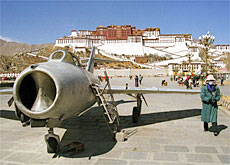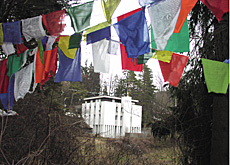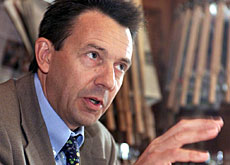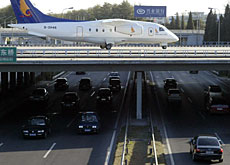Couchepin travels to troubled Tibet

Switzerland’s interior minister, Pascal Couchepin, has visited a Swiss-funded cultural project in Tibet as part of a week-long official trip to China.
Couchepin’s journey, the first by a Swiss minister to the mountain region, has raised a few eyebrows given China’s human rights’ record.
Officially, Couchepin has travelled to Lhasa to lend his support to a Unesco project.
Switzerland is contributing SFr200,000 ($160,000) towards the restoration of the Ramoche temple, which was built in the seventh century before being severely damaged during China’s Cultural Revolution.
Earlier work carried out by the Chinese authorities allowed 120 monks to return to the temple. The Swiss contribution will pay for the building’s restoration.
Representatives of the Tibetan government in exile say that restoring the temple, although welcome, is something of a façade in a region where religious freedoms were curtailed long ago.
“Most Tibetan prisoners are monks and nuns,” said Tenzin Sambhel Kayta, the human rights officer at the Tibet Bureau in Geneva. “They have been jailed because they refuse to denounce the Dalai Lama.”
Destroyed monasteries
Kayda admits that it is difficult to know exactly how many monks and nuns remain in Tibet, adding that 6,000 monasteries have been destroyed since China took control of the region in 1950.
According to the Tibet Bureau, China is actively trying to turn ethnic Tibetans into a minority in own land by encouraging Han Chinese to move to the region using financial enticements.
“The Chinese are not taking care of Tibetans’ rights or needs,” Kayda told swissinfo.
Couchepin expects to meet local and regional authorities while in Lhasa. He is hoping to discuss religious tolerance and cultural freedom with the Chinese in Tibet, as part of Switzerland’s ongoing dialogue on human rights with China since 1991.
Minority rights
The Swiss have focused in the past on legal and minority rights, especially in Tibet. Experts from China have also visited Switzerland on several occasions to look at legal reform processes and how to implement international standards.
Whether Couchepin intends to tackle his hosts on the thorny subject of Tibet is a matter for speculation. He was accused of giving the Chinese an easy ride on human rights during his previous visit to Beijing last November.
The region’s problems have caused friction between the two countries in the past.
In 1999, the Chinese president Jiang Zemin dressed down his Swiss colleague Ruth Dreifuss during an official visit to Bern after Tibetan militants demonstrated in front of the parliament building.
Criticism
But Swiss diplomats have said in the past that China is open to criticism of its human rights’ record and its treatment of minorities.
Couchepin’s Tibet visit did not become public until Friday – two days before his departure – when reports appeared in the Swiss media. Some members of parliament have taken exception to the trip.
“I don’t think it is very wise diplomatically speaking,” said Erwin Jutzet, head of the House of Representatives foreign affairs commission. “Personally, I have always refused to go to Tibet with an official Chinese invitation.”
Less controversial
The second leg of Couchepin’s trip promises to be less controversial. The minister will be attending the annual conference of the International Network on Cultural Policy in Shanghai on Friday and Saturday.
The meeting will be focusing on the role of traditional cultures in modern society and the challenges posed by globalisation.
The 63 member states of the network will also considering the promotion of cultural diversity, which is being discussed as part of a future Unesco convention. The final text will determine whether culture is a commodity or something that needs specific protection.
swissinfo, Scott Capper
Chinese troops overran Tibet in 1950.
The Tibet Bureau, which represents the Dalai Lama’s government in exile, says over a million Tibetans have been killed since then.
The Chinese authorities, which consider Tibet to have been part of China for 700 years, have labelled it an autonomous region, but encouraged Han Chinese to move there.
Switzerland is home to the world’s third-biggest Tibetan community, with 3,000 members.
Pascal Couchepin’s trip to China is the second in less than a year for the interior minister.
He was criticised for not tackling the Chinese over human rights during his last visit.
But Swiss diplomats have said that the Chinese are receptive to remarks concerning their rights record.

In compliance with the JTI standards
More: SWI swissinfo.ch certified by the Journalism Trust Initiative



You can find an overview of ongoing debates with our journalists here. Please join us!
If you want to start a conversation about a topic raised in this article or want to report factual errors, email us at english@swissinfo.ch.